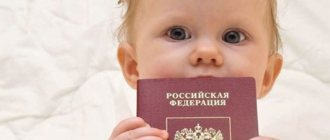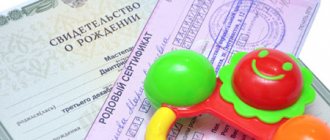A fair number of divorces, as well as the desire of many modern women to give birth to a child, as they say, “for themselves,” leads to the fact that currently in our country about a third of families are single mothers. The position of a single mother gives a woman the right to receive material support from the state, which is characterized by both one-time and long-term benefits, as well as many benefits and privileges in various areas of everyday life. The editors of FAN asked themselves what kind of child benefits single mothers are entitled to, what factors their size depends on, what benefits single mothers are entitled to claim in 2021, and, first of all, how one can obtain the status of a single mother, confirmed by the state. Yuri Kapshtyk, talks about this and much more .
photo from the personal archive of Yuri Kapshtyk /
Single mothers: what is the peculiarity of their status in terms of receiving state benefits?
Before considering the issue of paying child benefits to a single mother, you should understand what this status is.
“Legally, there is no fundamental difference between parents and a single mother, yet the category of single mother is allocated by the state, primarily conceptually. That is, legally a mother is recognized as single if she is raising a child alone and if the father is not identified and is not indicated on the child’s birth certificate,” says Yuri Kapshtyk.
Thus, even if in general the child lives surrounded by loving family members - uncles and aunts, grandparents, older sisters and brothers and, of course, his own mother, but the father did not recognize him and his data is not entered on the birth certificate, then the mother of such a child will be considered single and receives the right to appropriate financial assistance from the state. On the other hand, when the father recognizes the child as his own and the birth papers contain his data, but just as in the previous example, he lives outside the family and does not take part in raising the child, then the mother is no longer considered a single mother, even if in fact, she is raising the child alone, without the help and support of the above-mentioned family members. This is such an obvious injustice, nevertheless enshrined at the legislative level.
Federal News Agency /
Payments for children from 3 to seven years old.
If the mother’s family income is below the subsistence level, then a child benefit can be issued for the child from June 2021.
The child's age ranges from three to 7 years and 11 months.
The payment amount will be half the minimum wage - an average of 5,500 rubles across the country in 2021. And 11,000 rubles in 2021.
The benefit will be calculated from January 1, 2021, but will be paid in June 2021.
To whom then does the state pay benefits?
As we see, the status of a single mother, which would take into account all the life and financial circumstances of a parent raising a child alone, has not been established at the state level. There are only such legal concepts as “a person with responsibilities within the family” and “single parent”, recognized by the Supreme Court of the Russian Federation. In relation to the resolution of the plenum No. 1, issued in the above-mentioned institution in 2014, the following are considered individual characteristics that allow a woman to be classified as a single mother:
- the mother has obligations to raise, develop and raise the child;
- the mother actually takes care of the child alone;
- the child’s father died or was lost for some other reason;
- the child's father is deprived of parental rights or declared incompetent;
- The child's father has been declared missing.
As a result, as already mentioned, if the father accepted the child or the fact of paternity was recorded in court, then the mother does not have the right to count on assigning the status of a single person. It is also impossible for a mother whose marriage has been terminated to obtain this status, but the father is indicated on the child’s birth certificate, because legally the mere status of being divorced does not mean automatic acquisition of the status. In this case, one or another state financial assistance is not expected, and the mother has the right only to go to court to collect alimony. There is also the opposite set of circumstances: previously a woman had the status of a single mother, but then registered her first or subsequent legal marriage. In this case, the assigned status will be lost, since in fact she will not be raising the child and supporting the family alone. And finally, a woman will be denied the status of a single mother if she gave birth to a child within 300 days after the official divorce or other reasons that influenced the loss of the father of this child.
pexels.com/Elina Fairytale
Legislative regulation
Single mother's allowance is one of the types of financial assistance from the state to mothers raising children without a second parent or adoptive parent. Legal regulation of receiving benefits is carried out:
- Law No. 81 “On state benefits for citizens with children”;
- Law No. 255 of December 29, 2006;
- regional legislation.
Law No. 81 defines the types of maternity benefits and their amounts, and Law No. 255 regulates the specifics of receiving benefits paid to single mothers due to their disability.
Possible advantages and disadvantages of acquiring the status of “single mother”
The status of a single mother, recognized at the state level, is in many ways a double-edged sword. On the one hand, a child without a father may have more freedom in his movements, because the mother will not have to, for example, obtain permission from the second parent to take the child abroad. On the other hand, a woman who has officially become a single mother does not have the right to demand alimony from a man. What is better: benefits and financial assistance provided at the state level, or alimony, which sometimes has to be obtained through the courts and waited for years? A single mother must decide this issue on her own, thoroughly weighing the pros and cons.
Social help
As a measure of social assistance at the local level, single mothers are provided with a number of other guarantees, which, depending on the region of residence, may include:
- Priority admission to nursery.
- Reimbursement of expenses for the purchase of school supplies and uniforms.
- Allocation of vouchers for sanatorium-resort treatment.
- Free visits to museums and exhibitions.
- Free meals in schools.
A complete list of benefits can be obtained from local governments, as well as from the territorial department of social labor .
Watch the video: it explains how to obtain the status and what government payments you can count on.
Brief conclusion: For single mothers, both at the federal and regional levels, a fairly wide range of benefits and guarantees are provided. But in order to use them, you need to familiarize yourself with the list and obtain the appropriate status.
How much are standard payments to single mothers?
By default, the payment of financial assistance to single mothers is regulated by Federal Law No. 81. From February 1, 2021, a mother who is in single status, when a child is born, has the opportunity to receive a one-time benefit, the amount of which amounts to 18,886 rubles. Moreover, the benefit applies to each child born, does not depend on whether it is intended for a working or non-working single mother, and does not take into account the woman’s current income. Another thing is that if a mother does not work, she is deprived of the opportunity to claim the right to the most significant government payment - leave pay for pregnancy and childbirth. And her allowance for caring for a child up to one and a half years old will amount to only the minimum amount - 5036 rubles for the first baby, and a little more - 6803 rubles - will be the amount of financial support for a single mother for each child up to 1.5 years old, if she is raising two , three or more children.
The one-time payment upon the birth of a child may be increased depending on the region of residence of the single-parent family. Thus, in Moscow, in addition to the established amount of financial assistance to a single mother, upon the birth of her first child, a single mother receives an additional 5,500 rubles. If a single mother gives birth to a second, third child, and so on, payments to such a Muscovite from the state for each second and subsequent newborn will amount to 14,500 rubles in addition to the usual benefit.
pexels.com/Sarah Chai
Tax benefits
By virtue of clause 4, part 1, article 218 of the Tax Code of the Russian Federation, the mother has the right to claim a double tax deduction from birth until the child reaches adulthood, in the amount of:
- For the first and second child – 2,800 rubles.
- On the 3rd and subsequent – 6,000 rubles.
- For a student from 18 to 24 years old or a disabled child – 12,000 thousand.
The tax deduction is provided to a single mother only until she remarries. If a woman is already married, then she is not considered a single parent.
Other privileges and benefits for single mothers
It is important to understand that a mother who is officially single does not lose the right to receive regular benefits, benefits and privileges that are due to all mothers.
“First of all, it must be said that the benefits intended for single mothers are the same as for other parents, however, there are a number of additional payments directly for mothers raising children alone, including mothers of large families,” comments Yuri Kapshtyk. “For example, until the child reaches one and a half years old, a woman in this position will be paid a monthly allowance to a single mother. In such cases, she will also be entitled to single mother support payments for up to three years.
Plus, it is legislated that a single mother cannot be fired from her job, including due to a reduction in the staff of the workforce. You also cannot send her on a business trip without obtaining additional consent. In addition, a single mother has the opportunity to receive unlimited sick leave to care for her child until he reaches seven years of age. Well, an important point is that a single mother has the right to claim a double tax deduction. If we talk about new benefits for single mothers, it is worth noting, for example, that from September 1, 2021, they, like all parents, receive additional one-time financial assistance in the amount of 10 thousand rubles to prepare the child for school and 3 thousand rubles each for each child to purchase a school uniform.”
Like other parents, single mothers have the opportunity to receive maternity capital, which they can use to improve living conditions, purchase a plot of land with subsequent development, or to educate a child. At the same time, the amount of maternity capital depends on how many children are raised by a woman recognized as a single mother.
A separate category of mothers are low-income single mothers, who, of course, can also take advantage of the right to receive government benefits. An incomplete family is recognized as low-income, based on an additional assessment of the circumstances of the standard of living - if the material support for one family member, including the child and the mother herself, is an amount not exceeding the subsistence level.
“In this situation, the mother can count on preferential payment for housing and communal services, free provision of meals to the child in a secondary general education institution, and the right to priority enrollment of the child in budget-funded places when entering a university. In addition, low-income single mothers have the right to request sanatorium-resort treatment for their child,” says the expert.
It should also be borne in mind that in different regions of the country the package of benefits, subsidies, additional payments and other privileges may differ, so a specific list of them should be requested from the local social security authorities and, to obtain, contact the guardianship authorities, the pension fund and the MFC.
Benefits in the housing sector
One of the most expensive items in a single woman’s budget is providing adequate living conditions for a child, as well as paying for utilities, which is why in some cases they can qualify for housing benefits.
Acquisition and provision of housing
Despite belonging to beneficiaries, a single mother cannot qualify for free housing simply because of her status. However, there is an alternative. If, in general, the family is classified as low-income and needs to improve their living conditions, then in accordance with Article 49 of the RF Housing Code, it is possible to conclude a social rental agreement with the local municipality on the allocation of residential premises.
You can also count on partial payment of the cost of a new apartment, construction of a house, or repayment of a mortgage loan within the framework of the norms of Government Decree No. 1050 of the Russian Federation, but only if certain conditions are met. In particular, a woman must have Russian citizenship and her age must not exceed 35 years . The amount of assistance is 35% of the estimated cost of housing based on 42 m2 for 2 people and 18 m2 for each person if a woman has two or more children.
Benefits for housing and communal services
The procedure for repaying utility bills is regulated by regional legislation, which allows local authorities to reduce the contribution rate for certain categories, which include single mothers. As an analysis of regional legislation shows, single-parent families are exempt from paying for solid waste removal services until the child’s 3rd birthday ; no other benefits in the housing and communal services sector are provided for them, with the exception of the opportunity to apply for a subsidy.
Some other payments specific to single mothers from 2021
Maternity payments for low-income single mothers . They were introduced in Russia on July 1, 2021. The key requirements for obtaining this preference are to register for pregnancy before reaching 12 weeks, have an income less than the subsistence level, work, be on maternity leave, be registered with an employment center, or not work, for example, due to disability.
Benefit for children under 17 years of age . This payment for single mothers appeared in the country on July 1, 2021. Financial assistance of this kind will be issued every month, but the application for its receipt will need to be updated annually. It is important that not only single mothers, but also fathers, as well as official guardians of children from 8 to 17 years old, are entitled to receive the payment. The average per capita family income in this situation also cannot go beyond the subsistence level established in a particular region of residence.
Subsidies
We recommend that you read this article for comprehensive information on subsidies.
Under Article 159 of the Housing Code of the Russian Federation, mothers can apply for a subsidy, the meaning of which is to reimburse the costs of paying for utilities, but only under certain conditions. In particular, only if utility costs exceed the maximum allowable amount from the total total income, but taking into account the occupied living space, which does not exceed the norm.
The right to expand living space
You have the right to apply for the expansion of apartment meters only on a general basis. So, by virtue of clause 2, part 1, article 51 of the Housing Code of the Russian Federation, when providing living space under a social tenancy agreement that is less than the accounting norm per person, the municipality can provide an apartment with a larger square footage. But this requires an application, as well as available housing stock, which is rarely available.
How can I apply for benefits?
In order for a woman to be recognized as a single mother and accrue all available benefits and preferences, just one standard certificate in Form 25, proving the fact of the birth of a baby, is not enough. In addition, you will need to prepare a package of documents to attach to the application - this is a passport, birth certificate, a certificate certifying that the baby lives with the mother, a work record book (if available), a statement of the woman’s income (if she works) and, of course, bank account details for transferring benefits. If you receive a negative decision in response to your application, you can challenge it in court.
What can you spend maternity capital on?
The temptation for young parents to spend half a million rubles on cribs, strollers, diapers, nappies and other little things can be very great, but this is unlikely to improve their quality of life in the long term. Therefore, the conditions for the provision of family capital, among other things, indicate the specific purposes of the funds, although the recipient has the right to distribute them among them in any order. Expense items may be:
- Allocation of monthly assistance in the amount of the subsistence minimum for the second and subsequent children born or adopted after January 1, 2021;
- Payment of the first installment, repayment of debt and interest on loan agreements for the purchase or construction of residential real estate for the family;
- Purchase of a residential building or payment of a contribution according to an equity participation agreement in the construction of multi-storey residential real estate;
- Construction or repair of individual housing for a family independently or with the involvement of a contractor;
- Reimbursement of basic expenses for a previously built or renovated individual housing facility for a family;
- Payment by the recipient of state assistance of an entrance fee to a housing or housing construction cooperative;
- Payment for educational services, child care in preschool institutions and their accommodation in a dormitory during training;
- Reimbursement of costs for the purchase of special goods and services for the rehabilitation and return to society of children with disabilities;
- Replenishment of personal pension savings in state funds for the mother or father, if he is the recipient of the capital.
It should be taken into account that when purchasing housing using maternity capital, young parents will have to rack their brains over whether it is possible to sell an apartment purchased with a mortgage. The fact is that the law requires them to allocate proportionate children's shares in the property immediately after closing the loan and taking ownership.
What can you spend maternity capital on?
For regional maternity capital, the targeted spending of funds is checked no less carefully than for subsidies to small businesses from the state in 2022. For every penny spent, the recipient must provide a set of supporting documents, and there are not many possible options for using the assistance:
- Improving the living conditions of children, including buying or building a house, paying a down payment, repaying debt and interest on a mortgage agreement;
- Repair of residential premises in which the recipient of maternity capital and children identified as recipients of assistance live;
- Purchase of country houses, gardens and vegetable plots, subject to their registration as the property of the recipient of the certificate;
- Payment for education or child care in preschool and secondary institutions that have state accreditation;
- Payment for diagnostic and treatment procedures for children under the age of 18 in medical institutions with a state license;
- Purchasing a family car from an individual or from a dealership, provided that it is registered as the property of the recipient of the certificate;
- Compensation of costs for connecting residential premises to gas supply networks, water supply and sewerage, arrangement of a well or borehole;
- Reimbursement of costs for the purchase of equipment for the adaptation of children with disabilities if they have a rehabilitation program approved by doctors.
As in the previous case, residential real estate that has been renovated or purchased with maternity capital funds, immediately after the mortgage is repaid and the bank encumbrance is removed, must be registered as shared ownership with a proportional allocation of children's shares.
Who has the right to maternity capital?
It is logical to assume that regional maternity capital is intended to increase the birth rate and improve the quality of life of young families in a particular region. To prevent money from falling into the hands of enterprising visitors, a mandatory condition for allocating assistance is to live in the region for at least a year. In addition, local authorities have the right to independently choose which social and age categories of citizens to give benefits, whether payments will be made to single mothers in 2022 and how many children there should be in the recipient’s family. However, in most cases it is:
- Married and single women who gave birth or adopted a second, third or subsequent children during the period from January 1, 2012;
- Single fathers who have lost their wives or men who adopted a second, third or subsequent children in the period after January 1, 2012;
- Children in large families if their parents have died, been declared legally incompetent, been deprived of parental rights, or have committed crimes against them.
Parents need to take care of their employment, since receiving unemployment benefits in 2022 and simultaneously applying for maternity capital is not allowed. An exception is made only for citizens who have confirmed the first and second groups of disability, who are caring for seriously ill relatives, or who have another serious reason for not being permanently employed.
How to get maternity capital?
By analogy with the federal one, regional maternity capital has the form of a certificate.
It is provided by the Department of Social Protection of the Population at the applicant’s place of residence. Whether payments will be made to single mothers depends on the timeliness of the request for help: applications from parents for the allocation of regional family capital are accepted only until the child reaches the age of one and a half years. The funds themselves from maternity capital are sent to the parent’s individual account opened in the Treasury. Then they can be transferred in non-cash form to a company that supplies the recipient with the goods specified above or provides services, as well as to an individual who sells residential premises to a young family.
An order to dispose of funds is submitted at the local Multifunctional Center or through a personal account on the Unified State Services Portal. As a rule, the system requires you to attach a certain set of documents to it, including:
- Passport of the father or mother applying for financial assistance, with a mark of residence in the territory of the subject of the Federation;
- A birth certificate or a decree on the adoption of a child issued by the civil registration authorities;
- Birth certificates of older children or death certificates if any of them did not live to see the allocation of assistance;
- Marriage certificate, if the interested party in the real estate transaction is the spouse of the recipient of assistance;
- Certificates from the place of work, from the Employment Center and other documents demonstrating the total family income for the previous three months;
- Certificates and conclusions showing valid reasons for the lack of employment of an unemployed mother or father of working age;
- Bank statement indicating the details of the account opened by the recipient of the capital for the transfer of funds as part of financial assistance;
- Agreements of purchase and sale, provision of services, lease or mortgage loan, invoices, receipts and other documents confirming expenses for children.
How to get maternity capital?
Maternity capital is not issued in cash and is not transferred to the parent’s bank account. It is a certificate linked to the recipient’s account in the Treasury, so a citizen can send funds for certain purposes only by written or electronic order. From April 15, 2021, such a certificate will be issued to all young parents automatically, and data about it will be reflected in the owner’s personal account on the official website of the Pension Fund and on the State Services portal. After the birth of your child, you can periodically visit these resources and check whether single mothers are paid benefits.
If parents are not yet registered on the State Services website or keep the adoption secret, they have the opportunity to apply for a certificate by visiting the branch of the Pension Fund or the Multifunctional Center at their place of residence. You must make an appointment here in advance.
When submitting a request electronically, a message from the employee will appear in your personal account about providing additional documents, whereas when visiting one of the mentioned authorities in person, it is advisable to immediately take with you the relevant originals and copies. To obtain maternity capital you will need:
- Passport of the father or mother applying for financial assistance, with a mark of residence in the territory of the subject of the Federation;
- Birth certificates or adoption orders for all children issued by civil registration authorities;
- Marriage certificate, if the interested party in the real estate transaction is the spouse of the recipient of assistance;
- For a single father - the mother's death certificate or any documents confirming the loss of her right to receive assistance;
- For orphans - death certificates of parents or any documents confirming the loss of their right to maternity capital.










